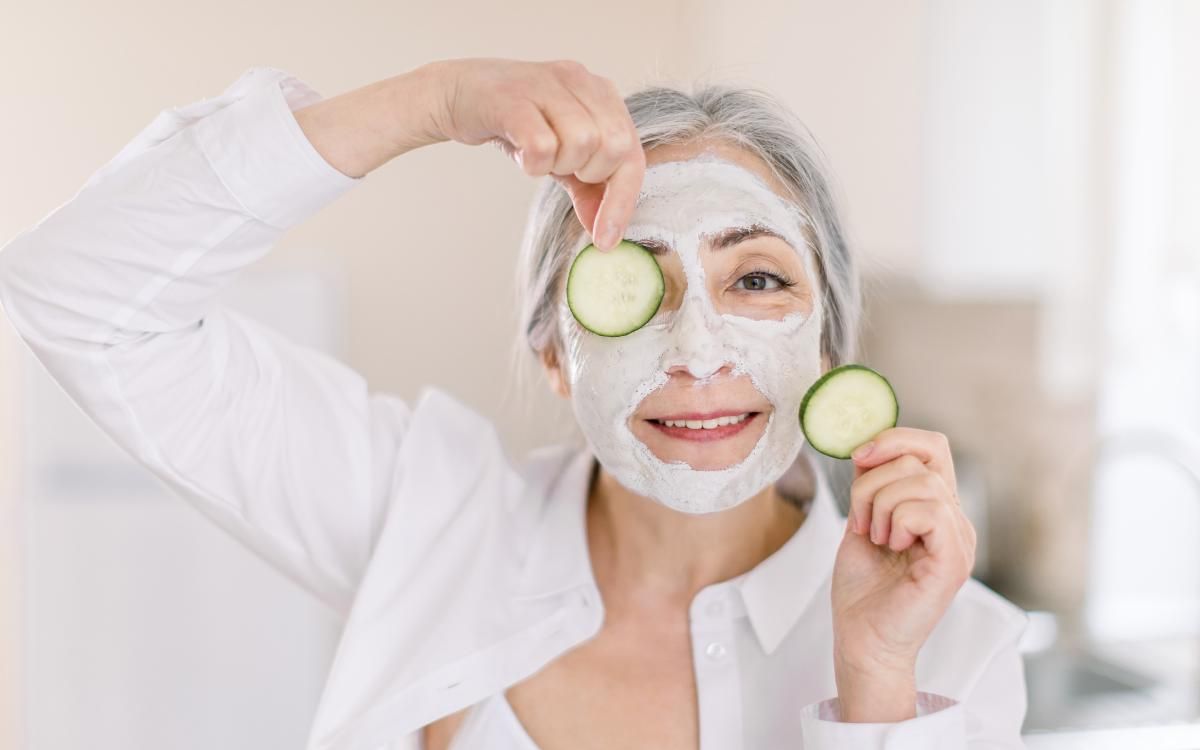As you age, your skin goes through many changes, influenced by factors like reduced collagen production, slower cell turnover, and environmental exposure. These changes are quite normal and happen to everyone. A gentle and effective way to support your skin’s changing needs is to take a clean beauty approach with natural ingredients. These can help nourish your skin while making you feel your best all day, every day.
How Skin Changes With Time
The skin undergoes many changes, which affect how it appears and feels. One of the most noticeable shifts is the gradual loss of natural hydration, making the skin feel increasingly dry. This happens because the skin begins to produce less natural oil, which is essential for retaining moisture. As a result, rough and flaky patches appear. At the same time, the skin becomes more sensitive as its protective barrier begins to thin and become more fragile. These conditions make the skin more reactive to environmental irritants, skincare products, and weather changes.
Another common change that you may experience is the breakdown of collagen and elastin, proteins that help keep the skin firm and supple. Fine lines and wrinkles begin to appear due to the decline in protein production.
Along with natural changes, external factors also play a significant role in how your skin changes over time. Prolonged sun exposure, especially to harmful UV rays, speeds up the process of collagen breakdown, leading to uneven tone and hyperpigmentation. Additionally, exposure to pollution allows harmful particles to enter the skin barrier, causing oxidative stress and inflammation, which can cause breakouts and dryness. Similarly, lifestyle factors, such as poor sleep, chronic stress, and unhealthy eating habits, affect your skin’s ability to renew and repair.
Why Choose Natural Skin Care
While it is not always possible to undo all the changes your skin goes through over time, you can still work toward making it more resilient and healthy. Given the effects of natural and environmental factors on your skin, natural remedies made with organic, skin-friendly ingredients can be a good choice, as they offer many benefits. These help to nurture your skin’s health.
Provides Gentle Nourishment
Many natural ingredients, such as oils and herbal extracts, provide essential vitamins and moisture to your skin. These help maintain hydration and softness without leaving your skin feeling excessively dry. The gentle nourishment from such ingredients is especially helpful if your skin feels delicate or is prone to dryness.
Reduces Irritation
Most natural and organic ingredients have soothing properties. So, they are less likely to cause problems like burning, itching, and redness. So, even if your skin is sensitive or prone to allergies, you can use some of these ingredients without worrying about reactions.
Fights Off Free Radicals
Many natural ingredients are packed with essential antioxidants. These help protect your skin from free radicals, small particles produced by pollution, sun exposure, and stress. Free radicals can damage your skin cells. Over time, consistent damage accelerates the appearance of fine lines, wrinkles, dark spots, and dullness. However, antioxidants help your skin fight free radicals, helping your natural radiance stay protected.
Supports Skin’s Resilience
Many herbal ingredients have properties that help your skin repair itself and strengthen its natural barrier. This process makes your skin healthier, allowing it to retain more moisture and protect against external irritants.
Has Active, Proven Ingredients
Certain botanicals found in nature have active ingredients proven to help with skin sagging and uneven texture. These work within the skin when used over time to smooth texture and promote a healthy radiance.
Popular Natural Ingredients That Support Your Skin
You get the best benefits of nature when you include organic ingredients in your skincare routine. Each of these ingredients supports your skin’s unique needs. These ingredients work gently yet effectively to hydrate, soothe irritation, boost firmness, and support your skin’s health. Many of them are packed with vitamins, antioxidants, and essential fatty acids that help repair and nourish, making them good choices as your skin changes over time.
Aloe Vera
This plant gel is packed with vitamins, enzymes, and amino acids. These help soothe irritated skin and reduce inflammation and redness. Additionally, aloe vera has hydrating properties that help restore moisture to dry, sensitive skin. Then, some antioxidants protect the skin barrier against environmental damage while supporting healing and repair.
Coconut Oil
Enriched with natural fatty acids, coconut oil is widely used to hydrate and nourish the skin. It also has antimicrobial properties that help protect against infections.
Jojoba Oil
Your skin has its own natural oils known as sebum. Jojoba oil works similarly to natural sebum, providing balanced hydration without clogging pores. It also contains vitamin E and antioxidants that protect skin cells and strengthen the skin barrier. This helps to reduce dryness and inflammation.
Turmeric
Curcumin, a powerful antioxidant and anti-inflammatory agent, is present in turmeric. It helps to brighten skin tone while reducing the appearance of age spots, discoloration, and redness.
Green Tea Extract
Rich in polyphenols, green tea is a powerful antioxidant. It fights free radicals that may be present in your skin because of pollution and UV rays. At the same time, it has calming properties that reduce irritation and help calm redness, giving a clearer and even skin tone.
Chamomile
This botanical is popular for its anti-inflammatory and calming effects. It helps soothe redness and irritation, making it suitable for sensitive skin. Chamomile also helps repair damaged cells, allowing your skin to recover and replenish faster.
Honey
Naturally antibacterial and full of antioxidants, honey works as an organic moisturizer that deeply nourishes your skin while protecting it from bacteria. It also supports repair and healing.
Yogurt
Yogurt contains lactic acid, a natural alpha-hydroxy acid (AHA). It is useful for gently removing dead skin cells. The result is smoother, firmer, and brighter skin. It also contains probiotics that help balance the microbiome in your skin’s layers while improving your skin’s natural moisture retention.
Shea Butter
Packed with fatty acids and vitamins A, E, and F, shea butter deeply nourishes and hydrates dry skin, restores the skin’s protective barrier, and improves elasticity.
Rosehip Oil
It contains high levels of vitamins A and C, which stimulate collagen production and promote skin regeneration. The fatty acids in rosehip oil help reduce fine lines, scars, and dark spots while improving overall texture and radiance.
Calendula
It supports wound healing, calms inflammation, and soothes irritated or sensitive skin because of its anti-inflammatory and antiseptic properties.
Fruit Peels
Orange and lemon peels are rich sources of natural vitamins, particularly vitamin C. These also contain organic acids that boost cell turnover and support exfoliation. The vitamin C in these ingredients improves collagen production. You can use fruit peel powders with milk or yogurt as a natural, organic scrub to smooth your skin’s texture and reduce dullness.
How to Build a Personalized Clean Beauty Routine
Start by building a personalized clean beauty routine that focuses on what your skin really needs. This involves using gentle, non-toxic ingredients and homemade masks to keep your skin healthy, comfortable, and resilient. To make sure you’re doing it right, pay attention to how your skin feels day to day and adjust your routine and products accordingly for better results.
Steps for a Personalized Routine
Start With Gentle Cleansing
The first step in every skincare routine is removing dirt, debris, and excess oil from the skin. For this, you can use a mild cleanser, such as a yogurt-honey mixture. To make this DIY cleanser at home, mix one tablespoon of plain yogurt with one teaspoon of honey. Make sure the yogurt has no flavors, added sugar, or colors. Gently massage this mixture onto damp skin. Then rinse it slowly with slightly lukewarm water. This removes all dirt without stripping moisture from your skin.
Hydrate and Moisturize Daily
Once your skin is thoroughly cleansed, apply a moisturizer. Anything that has natural hydrating properties can work wonders for your skin. Ingredients like jojoba oil, aloe vera gel, and shea butter are popular organic moisturizers that many include in their clean beauty routines. If you’re looking for lightweight hydration, apply a few drops of pure jojoba oil to your skin. On days when your skin needs extra hydration, you can use aloe vera gel or a mix of aloe vera with a few drops of rosehip oil.
Weekly Natural Treatments
Along with daily cleansing and hydration, you can add a few other natural skincare remedies into your routine. A DIY enzyme mask is a good way to soothe your skin and provide it with extra nourishment. You can make this with two tablespoons of mashed fresh papaya. Mix it with a tablespoon of yogurt and a teaspoon of honey. Apply this mask to your face and rinse it gently after 15 minutes. You can use an organic exfoliant made with finely ground oatmeal. Mix a teaspoon of this with a teaspoon of yogurt. Gently massage onto skin and rinse after five minutes. Applying this once or twice a week can help your skin repair and renew.
Targeted Care for Specific Concerns
Sometimes, your skin has specific needs. For instance, your skin might feel irritated or inflamed on days when the weather is bad, you have an allergy, or your hormones or sugar levels shift. In such situations, you can include natural remedies, such as dabbing cooled chamomile tea, into your routine. Or if you have been in the sun all day, you can use a few drops of rosehip oil or a turmeric-honey mask to brighten your skin and improve its resilience.
Some More DIY Recipes Using Natural Ingredients
Chamomile Mist
Steep a spoonful of chamomile tea for a few minutes. Strain out the tea leaves, then let the tea water cool to room temperature. Pour it into a spray bottle and spritz onto your face regularly for a calming dose of hydration. You can store this solution in the refrigerator for a few days.
Turmeric Mask
Mix a teaspoon of turmeric with a tablespoon of honey. Make sure there are no clumps. Add a few drops of rosehip oil to this paste. Apply it to your face and let it stay for about 10 minutes. Then rinse it gently with lukewarm water.
Shea Butter Night Balm
When you need deep hydration, apply this mask overnight. Simply blend a tablespoon of shea butter with a teaspoon of coconut oil and two drops of rosehip oil. Take a small amount in your hands and warm it up. Gently massage into your skin right before bed to get glowing, soft, supple skin the next day. This also makes it useful for repairing and softening rough patches of skin.
Green Tea and Chamomile Toner
This organic toner, made from green tea and chamomile, offers added benefits, including hydration, pore tightening, improved skin texture, and antioxidant protection. To make this toner, add one bag each of green tea and chamomile to a cup of boiling water. Let the tea bags steep in water for 10 minutes. Then cool it down and pour it into a spray bottle. Mist it all over your face right after cleansing.
Jojoba and Rosehip Oil Serum
Combine a tablespoon of jojoba oil with a teaspoon of rosehip oil. You can also add a couple of drops of vitamin E oil to this. Gently press a few drops of this serum onto clean, damp skin. You can do so this morning and evening, as needed. This serum works as a lightweight moisturizer, supporting your skin’s elasticity and reducing the appearance of fine lines over time.
Calendula and Aloe Gentle Gel
For sensitive or irritated skin, use this soothing gel for spot treatment. Combine two tablespoons of aloe vera gel with a teaspoon of calendula oil. You can infuse dried calendula in olive oil if you can’t find ready-made calendula oil. Store the gel in a jar in the fridge. You can apply a thin layer on the affected areas whenever needed.
Coconut and Oat Moisture Scrub
To remove dry skin patches and provide instant hydration, a scrub can work quite effectively. Make a paste by mixing a tablespoon of coconut oil with a tablespoon of finely ground oats. Gently massage it in the dry area for a couple of minutes. Rinse it off with cool water to achieve smooth, supple skin.
Lemon and Rose Water Brightening Toner
You can use this toner to refresh and revitalize your skin daily. The added benefit is that lemon and rose water work together to brighten your skin from within, giving an even tone and radiance. To make this, mix half a cup of filtered water with one tablespoon of rose water and one teaspoon of fresh lemon juice. Apply using a cotton pad after cleansing. If you’ve sensitive skin, you can skip the lemon or dilute the solution by adding more water.
Tips for Listening to Your Skin
Not all routines and ingredients have the same effects on everyone’s skin. Besides that, your skin can feel different from season to season and even from day to day. This is why it is important to listen to your skin, so you can be flexible and adjust your skincare practices for the best results.
- Make sure you check how your skin responds to any new ingredient and routine. Look for signs such as tightness, excessive oiliness, or irritation.
- Change the frequency of any masks or ingredients if your skin has redness or feels uncomfortable. Similarly, increase hydration if it feels too dry or itchy.
- Swap your ingredients whenever needed. For instance, you can switch up yogurt for aloe vera in your mask on the days when your skin feels too sensitive.
- Always patch test new ingredients and products one at a time. This helps to immediately determine whether your skin is reacting positively or negatively to the new routine. If an ingredient feels uncomfortable, you can skip it or swap it with something gentler.
- Remember that natural remedies take some time to give results. It may take time to see how effective homemade skincare is.
Extra Steps You Can Take Beyond Skincare
When taking steps to support your skin’s health naturally, you also need to think about your overall lifestyle. This is because what you eat, how you manage your stress, and how well you sleep also affect how your skin looks and feels over time. So, it is essential to take a holistic approach that includes healthy habits. The benefits you get from these extra steps can enhance the effectiveness of your natural skincare routines.
Stay Hydrated
Water is not enough for hydration. While you do need to drink plenty of it, you also need to supplement with hydrating fluids, such as soups, broths, herbal teas, and fresh juices. This can help to keep your skin plump and naturally moisturized from within.
Eat Wholesome Meals
Make sure you eat a variety of fruits and vegetables that are rich in vitamins and antioxidants. Even nuts and seeds, which contain healthy fats, support your skin’s elasticity, keeping it soft and firm.
Get Quality Sleep
A consistent, restful sleep is essential to allow your skin time to repair and regenerate overnight. Having a calming nighttime routine improves your sleep quality.
Manage Stress
Even with a consistent skincare routine, your skin may not show results if you are constantly worried and stressed. To avoid this, you can practice meditation and deep breathing techniques, and pick up hobbies you love.
Get in Some Physical Activity
Activities like walking, yoga, or stretching improve blood circulation, which is essential to providing nutrients to your skin. Regular movement also supports your overall well-being, making your skin radiant and resilient from within.







There are no comments yet